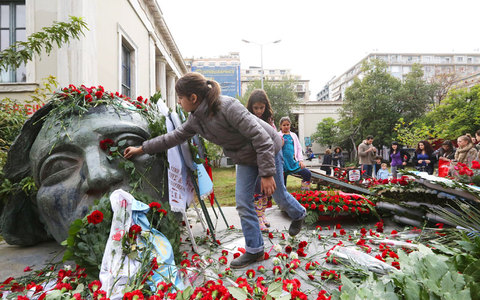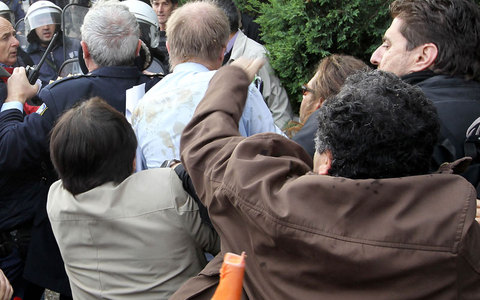Title photo: from the archive of the public ERT TV
Anastasia Balezdrova
39 years ago, on 17 November 1973, students from different faculties and ordinary citizens had gathered at the building of the Athens Polytechnic School, where they opposed the military dictatorship ruling at the time.
Their rebellion was suppressed with tanks, which entered the courtyard of the school. And here, the contradictions begin that are tormenting the Greek society now more than ever. The first one is that Greek history is still silent on the number of casualties. According to the left, their number was great whereas a few days ago, Golden Dawn directly stated that the events never happened.
This has provoked strong reactions from the left parties and a real war on the internet, where some people with a good memory have recalled that in the past, the Communist Party denied the events too.
The truth is that only one piece of research has been conducted in recent years, which is not even finished yet. It shows that the number of people who died during the riots in November 1973 was 24 and official documents prove it.
The economic crisis has unleashed new passions in the Greek society in terms of this turning point. It certainly had marked the beginning of the changes that led to the restoration of democratic government in Greece. But today, for the majority of Greeks, it is these subsequent years that are responsible for the present state of the country. Subsequent governments not only have ensured political and social stability, but along with their populism, they have accumulated the huge public debt and created an army of public workers for the sake of whom everyone else in the country makes sacrifices.
The only thing that has been stirring the spirits even more is the way in which the "heroes" of the events at the Polytechnic School have participated actively in the government. The constant expression, "The Polytechnic's generation has brought us here" can always be heard during protests and discussions.
The descriptions of the heroes known to nobody who have just continued to live as usual after the rebellion, and the others who have benefited from the privileges "of the Polytechnic’s champions" are in the following text published on social networks, "They both were there that night. One of them has continued to live as before, to paint houses to ensure length of service for retirement with hard work that has had its effects on his health. The other one, not spending even a single day in the public service, where the "damn right" has appointed him, received a lump sum at retirement to the amount of 220 thousand euro and monthly pension of 2,900 euro and still pretends to be a "rebel teenager".
"To the people who experienced the events, to the participants and the rest of society at that time, the events at the Polytechnic School were a rebellion for freedom, an act of heroism on the part of the youth of the time. And rightly so.
To all who were under the age of 15 on the night of 17 November and to the next generations, the Polytechnic School is the greatest curse of the modern Greek state. The events of that time have put a heavy burden on their shoulders, a mental burden unsurmounted to date. Any subsequent young generation has been strangled by this burden because it has been living in a time of peace and democracy, which has not provided any opportunity for acts of heroism. The slogan "Go for the Polytechnics of our generation" totally proves this," was written today on the Facebook social network by a young man, whose fellow students will set off tomorrow to the traditional procession to the United States embassy.

Meanwhile, the courtyard of the Polytechnic School resounds with songs of the time, the participants are shouting slogans of the time, and why should they not do it after the genius of the music, but not of his political positions, Mikis Theodorakis, has said, "We are living in almost the same conditions today. Let's hope that people will wake up." And so, supporters of left parties and organizations threw water and coffee at the Deputy Minister of Education Theodoros Papatheodorou, who went to the Polytechnic School to lay a wreath in memory of the victims.
Earlier, they had attacked a group of young people - members of the youth organizations of other parties, as they believed that they had no right "to insult the memory of the heroes." Such "revolutionary" beating between the left and the students from PASOK and New Democracy has been part of the tradition of the celebrations for years now.
The consul of Germany in Thessaloniki became the victim of equally rebellious municipal employees and their trade unionists in the city. They attacked him before he could enter the hall hosting a Greek-German business forum. The reason was the statement of Germany’s Deputy Minister of Employment Hans Fuhtel, who had said a day earlier that 1,000 people in his country were doing the job of 3,000 municipal employees in Greece.

In his statements after the attack, the consul said that the right to protest was undeniable and joked that municipal officials wanted to treat him to coffee, but did not choose the traditional way. Belatedly, police seized three protesters in connection with the attack on the German diplomat, which enraged their colleagues and they held a protest in front of the police station in Thessaloniki.